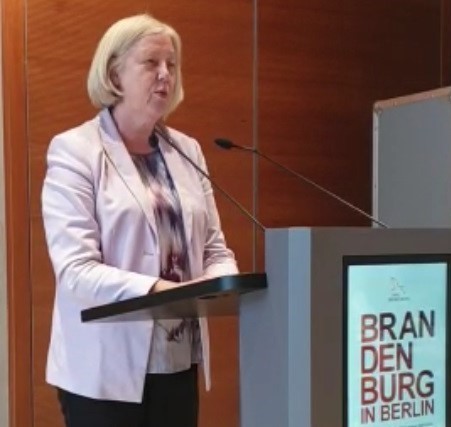
On 24th of September 2021 in the residence of state representation of Brandenburg in Berlin, Germany took the final meeting of „In Between? Neighbours meet in the Borderlands“. This was an event from Europäischen Netzwerks Erinnerung und Solidarität (ENRS) (European network for remembering and solidarity) in co-operation with Stiftung Erinnerung, Verantwortung, Zukunft (Foundation Remembering, Responsibility and Future) as part of the programme Europeans for Peace. The Travel Bursary recipients came together for the evaluation and the presentation of their experiences. The students learnt in this programme how to conduct an biographical interview according the methods of Oral history and how to document their work in a multi-media form. During their travels, the young people researched the changeful history of these regions. As a result of the Second World War, the Shoah and the division of Europe, many of these cultural references were cut off, suppressed or forgotten. At the same time, new connections have grown in the course of the European unification process.
The Project have been done this year in co-operation with
- Ośrodek „Pamięć i Przyszłość Wrocław (Centre of Remembering and Future)
- Ústav pamäti národa (National Memory Institute Slovakia)
- Kreisau-Initiative e.V. (Krzyżowa)
- Volksbund Deutsche Kriegsgräberfürsorge e.V. (German War Graves Commission)
Local Partners:
- Muzeum Kresów w Lubaczowie (Museum of Borderlands in Lubaczów)
- Centrum Kultury Polskiej i Dialogu Europejskiego w Iwano-Frankiwsku (Centre for polish culture and European dialogue in Ivano-Frankivsk)
- Jugendbegegnungs- und Bildungsstätte Golm (Youth meeting and educational center Golm)
Since 2016 18 Regions in Middle, East and South Europa have been visited.
- The authorized representative of the state of Brandenburg on the federal level, State Secretary Dr. Jutta Jahns-Böhm gives the greeting word:
Dear students, dear guests,
I would like to first congratulate the organizers for developing in between which is such an interesting advance project for young people. If it didn’t already exist, it would have to be invented. The project focusses on European borderlands, which is especially for Brandenburg of great importance. Therefore I’m very happy that you are today guests in our state representative here in Berlin to tell us your personal experience from your journeys to the German colleges. Due to our approximately 252 kilometre long border to Poland. Poland is especially a top priority for Brandenburg and in the light of our painful history. I’m very grateful that our neighbours were able to develop such a good cooperation in the last decades. Exactly 30 years ago the German-Polish treaty on good neighbourhood was signed. That means for reconciliation. Today, Germans and Polish living, working and learning across the shared border ensuring that our two countries continue to come closer in a quite natural way. However, the idea that Europe is a Europe of open borders cannot be taken for granted, as we have noticed during the corona virus crisis. For people living in the German-Polish border region it was very painful that in 2020 the border was even temporarily closed. Families were separated, workers couldn’t go to work. In this year fortunately we managed to keep the small border traffic open for families, workers, students and pupils.
I’m very impressed by your interest and commitment in exploring the history of the European border regions. So I’m very curious about the results and I’m happy to stay here to see what you achieved.
Thank you very much.
- The greeting word of the representative of Volksbund Deutsche Kriegsgräberfürsorge e.V (German War Graves Commission):
Dear state secretary Dr. Jutta Jahns-Böhm,
dear director Podgulski,
dear Annemarie,
dear colleagues and participants,
“I’m very happy to welcome you in the name of the German War Graves commission today in this wonderful place. In between, borderland this fascinating project and we saw some of your presentations as warning and so thrilled to see now the final results. First of all I would like to thank the European Network Remembrance and Solidarity for the great initiative and responsibility and future with kind funding and I’m very happy that the German-Polish team there could make a significant contribution. Last but not least I would like to thank our host, the representation of the State of Brandenburg for such a fantastic event and for the beautiful occasion of European understanding. Let me say a few words about the works von Deutsche Kriegsgräberfürsorge. The German Wargraves Commission understands wargraves as transnational places of learning encounter European history. The humanitarian organization founded in 1919, so right after World War I, is still today in search and identifies war dead from the world wars. It maintains 832 wargrave sites in 46 countries together with international partners. So it looks after relatives and at the same time it promotes international encounters between people, that’s why we’re all here. We have been involved into youth and educational work and that also almost for 70 years because the first youth exchange on a wargrave site took place as early as in 1953. So from the tradition to the present, history in its places must be actively reinterpreted by each generation.
So that continues to make sense to us and that is something we saw in the study trips, it’s the discoverage and interpretation of history. The consequences of war and it shouldn’t be forgotten, so that’s why history makes sense to us. In today’s world relatives that connect us, not those that divide us, make sense. It doesn’t mean that we all need the same relative, we never mind that’s the same relative, one European relative, but we should know different ones, we should know relatives of the other, be aware of the diversity and this is how we as European citizens can change the future.
The European Network Remembrance and Solidarity acts in this mission and we have made them for as a special partner. The team of the borderlands and traditional transnational history unites us. It is the only wargrave service in the world to operate for border regions. They’re all in border regions located, so one is in the border region with the Netherlands, one with Belgium, one with France and one with Poland at Usedom where one of your teams stayed. At these locations, which are located on the wargrave sites at this whole mission, the Wargrave Commission committed a professional contribution to international understanding about the past of our coexistence in Europe today. So now, I think I’ve said enough. I’m very much looking forward to the results of the research on the borders between Poland, Germany, Slovakia and Ukraine. Thank you very much.”
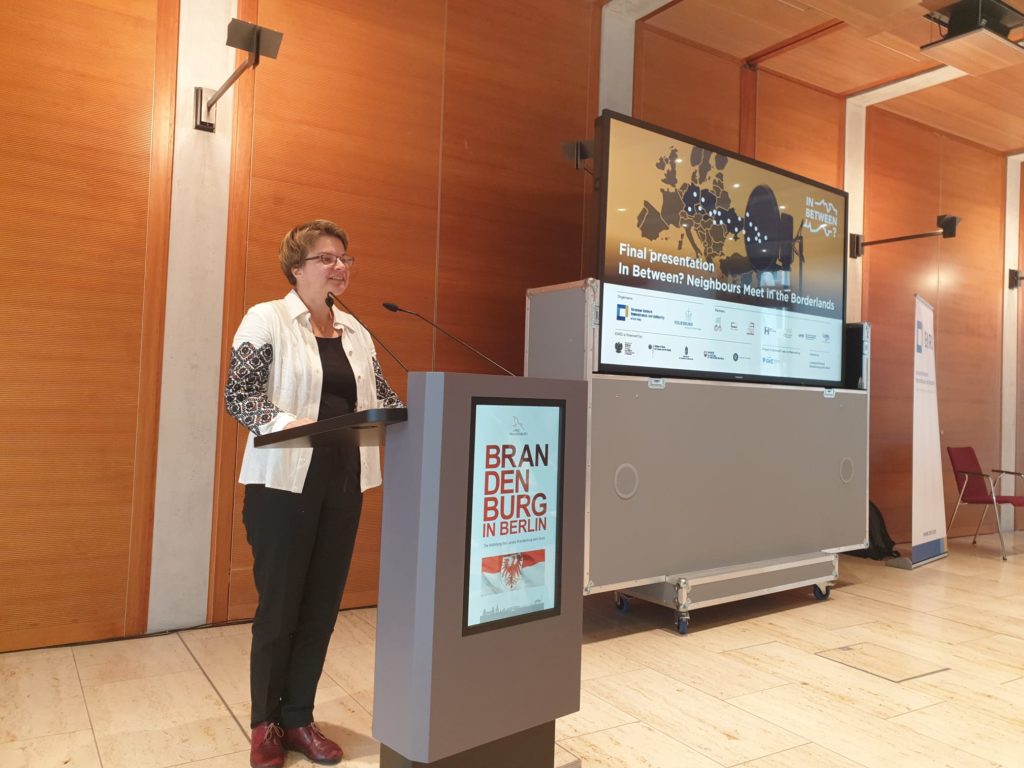
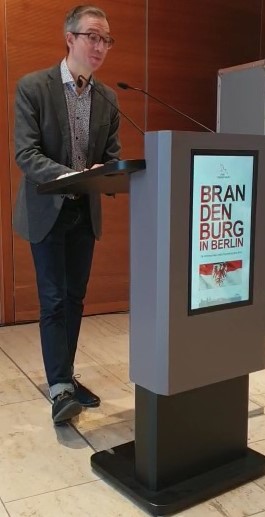
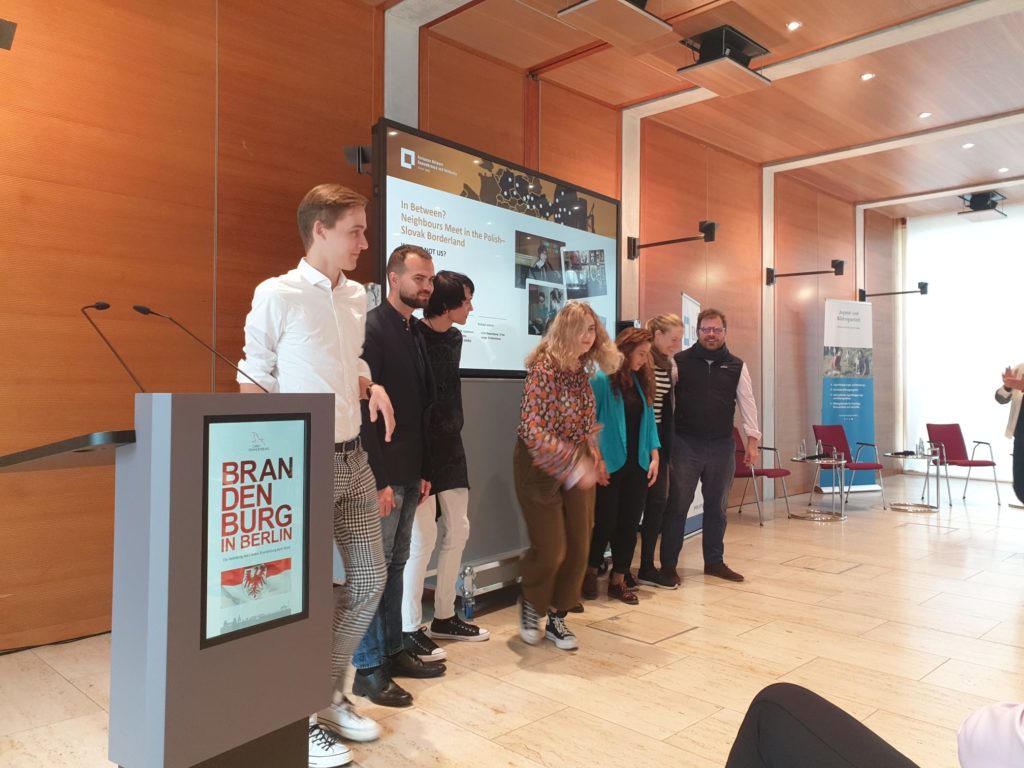
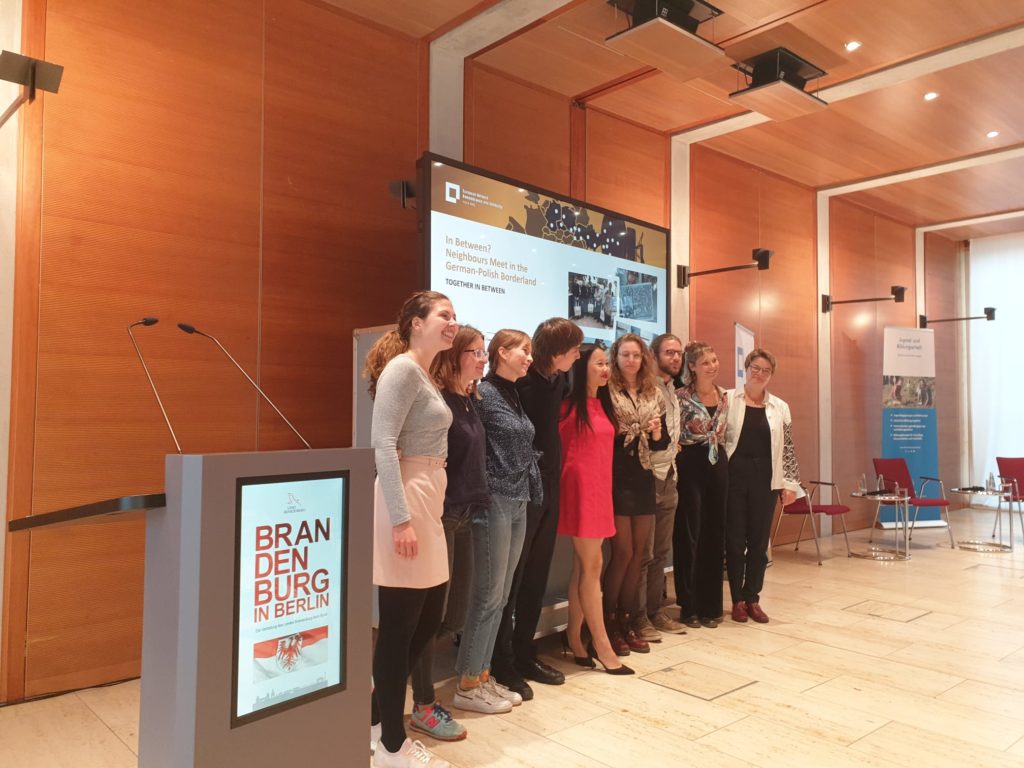
Geschrieben von Mag. phil. Nader Mohamed
verschriftet von Kirsten Mische








